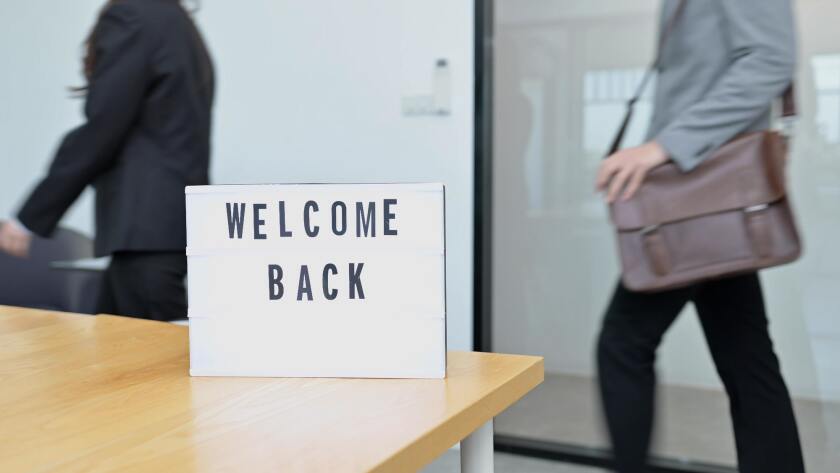If I were to hazard a guess, I’d say around 60% of people reading this article are somewhere other than in their office.
The majority of people are, for the time being at least, working remotely more often than not. In my experience, most people go to the office once or twice a week.
Ask me again in six months’ time, however, and my prediction may have changed.
Old normal?
It’s become increasingly clear over the past few weeks that law firms are starting to coax (or should I say force) lawyers back into the office setup.
News website Above the Law reported on August 9 that US firm Vinson & Elkins, which also has a UK office, had emailed staff to inform them that unless they had “an approved fully remote work arrangement”, they must come into the office four days a week.
That news followed similar moves by other firms including Ropes & Gray and Davis Polk & Wardwell.
UK outfit Osborne Clarke, meanwhile, has tied bonus eligibility to office attendance and has called for lawyers and staff to spend more time in the office than out. In other words, the firm wants people to attend the workplace at least three days per week.
So, after around three years of remote working and companies extolling the virtues of flexible arrangements and the so-called ‘new normal’, is it time to embrace the office environment again and go back to what we once knew?
I’m not convinced.
The main reason for encouraging a return to the office, according to the firms, seems to be collaboration and connectivity. Most businesses are strangely quiet on the fact they have large office spaces in central and expensive locations that aren’t being utilised, but that’s clearly a factor too.
When Osborne Clarke announced its new requirements, the firm’s chief people officer Graham de Guise said: “We do feel working in the office brings so many benefits in building and maintaining relationships, collaboration sparking ideas and learning from each other, as well as preserving our unique culture.”
I don’t doubt these aspects are sometimes lost when working remotely.
Video calls can be trying and it’s sometimes frustrating not having the ability to wander over to someone’s desk or to ask the person next to you a question.
But I’m not sure a mandatory three or four days is necessary, or indeed useful. You can still experience those office benefits de Guise misses by attending for one or two days.
Personally, I like to go in at least once a week, but not as many as four.
I always try to time my office day (or days) so that at least one colleague is there too; sometimes I arrange a meeting with an external contact.
I find “relationships” and “collaboration” can still be maintained well, even with this level of contact.
Sure, working remotely is quieter – and that can be lonely. But it can also be a godsend.
There are times when I come back to the office when I wonder how I ever got anything done when I spent five days a week there.
Self-important and loud phone calls, people who seem to think a keyboard is an object that deserves to be punished, and office chit-chat are no concern when working from home.
I suppose all those things are part and parcel of working in an office, but when you strip away those distractions, productivity (or mine at least) improves.
Surely law firms will have noticed that too?
If it ain’t broke
Crucially, the law firms advocating for increased office attendance all agree that their firms have adapted well to remote working.
So why the need for change?
Sure, collaboration and teamwork are great, but it doesn’t need to be almost every day to be effective.
I know there will be certain commentators and wings of political parties who will say people like me are just lazy, that we must spend all day in cafes, or that we simply float around our homes making cups of tea and doing our washing and cooking rather than working.
As it happens, I do put the washing on some days. And, of course, I make tea, but I would also do that at the office only with worse teabags and a potentially awkward ‘water cooler’ chat with someone I don’t really know.
Another benefit I, and many others, enjoy from remote working is the lack of a commute.
Since COVID-induced remote working started in 2020, I have worked outside of traditional working hours more than I did when I was in the office.
Who’d have thought that not having to navigate trains and people’s armpits for more than two hours in the morning and evening frees up a lot of time?
I also have two children who need to be picked up from nursery at around 5pm (they would have to find their own way home if regular office-based work became mandatory).
When they are in bed (OK, this can take a long, long time), I find that because I did not need to add a mad commute into my schedule, I at least have some energy to log in again.
Future proof
It’s worth noting that the main decision-makers behind these new requirements at law firms are likely to be the partners, the majority of whom we know are in the older, perhaps even old-school, generation.
I’m sure they already have, but it might be worth them talking to colleagues from across different seniorities and age groups to ascertain what works for them.
The current crop of associates will be the partners of the future and they may well have a different idea of what that future should look like.
There will be some young associates for whom remote or flexible working is all they’ve ever known, and if they are doing well in that setup, then why would they change?
Even if the percentage of those working remotely begins to decline in the short term, it may well rise again in the long term.
We may just need to wait until the next generation takes over before the pendulum swings back again.











